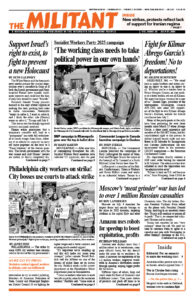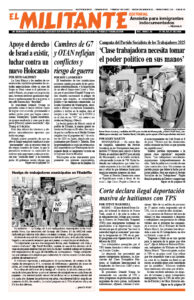OAKLAND, Calif. — Milton Chee, 85, a member of the Socialist Workers Party for three decades, died in South San Francisco June 16 after a long fight with serious illnesses. A gathering to celebrate his contributions as a party member was held following a Militant Labor Forum here June 29 on “Amnesty for Undocumented Workers: Key to Uniting the Working Class.” SWP leader Betsey Stone described Chee’s political life and contributions to the party, and participants enjoyed a buffet spread and looked at photos and articles on Chee’s activities in the party.
Chee was born in New York City to a Chinese immigrant family. Encouraged by his family, Chee enrolled in The Citadel, a military college in Jim Crow South Carolina, in 1957. He left after a year, disgusted by the racism against Blacks and Asians and the Jew-hatred he encountered.
Later he was drafted into the army and served two years as a medical clerk.
An accomplished jazz musician on the vibraphone, piano and guitar, Chee played at jam sessions in New York City as a young man. He continued to play for most of the rest of his life.
He moved to San Francisco, where he met the SWP in 1967. A postal worker at the time, one of the stops on his route was the office of the coalition organizing the April 1967 march protesting Washington’s war against Vietnam.
“One day he knocked on the door,” Stone said, “and, not surprisingly, SWP members were in the office, because the SWP was deeply involved in building and pointing a working-class road forward for the fight against the war.” Chee got involved, and, based on his experiences, decided to join the party in 1968. “In the SWP he was introduced to the Cuban Revolution, which convinced him that it is possible, with leadership, for workers to take power from the capitalists and begin to transform society.
“In the late 1960s some Chinese and other youth — including an ultraleft wing of the anti-war movement — were supporters of Mao Zedong and the Chinese Revolution,” Stone explained. “That revolution ended imperialist domination of China and made gains, including ending anti-women practices inherited from the old society. But Mao and the rest of the revolution’s leadership had been trained by the counterrevolutionary Stalinist regime in Moscow. They established a brutal dictatorial rule over the workers in China, with Mao as the cult leader.
“In the SWP Chee found a party that could explain the Stalinist character of the Maoist bureaucracy and offer a revolutionary alternative,” Stone said. “The Maoists here — and there were a lot of them in the Bay Area — organized to break up meetings of those they disagreed with, using violence, race baiting and cancel culture, just as Mao used repression and violence to sideline those who challenged him in China.”
In 1978 Chee helped successfully defend an event at the University of California in Berkeley where Iranian poet Reza Baraheni, a supporter of the growing revolutionary movement in Iran against U.S.-backed Shah Reza Pahlavi, was attacked by Maoist thugs.
New openings in the unions
The party saw new openings to participate in struggles by workers in the industrial unions in the late 1970s and organized its members to get jobs in union-organized industries. Chee moved to Atlanta and got a job at a Lockheed warplane plant in Marietta, Georgia. Lockheed fired 15 members of the International Association of Machinists there, including Chee, in 1980, claiming the unionists showed up in Lockheed “security” files as suspected members of the SWP. All had been active members of IAM, involved in struggles against speedup and unsafe working conditions in the plant. Most also belonged to the SWP and were active in opposition to Washington’s “contra” war against the unfolding Nicaraguan Revolution.
Files showed that Lockheed had finks reporting on all union meetings, as well as on discussions and activities of union members on and off the job. Thick files they had put together on the workers collected from their finks, police agencies and the FBI’s political dossiers, turned up absolutely nothing illegal.
Aided by the Political Rights Defense Fund, the fired unionists waged a nationwide effort to expose the role of the FBI and the stakes for the unions in their case. It was an important part of the Socialist Workers Party’s lawsuit against the U.S. government, which went to trial in 1981. The suit charged government agencies with “illegal acts of blacklisting, harassment, electronic surveillance, burglary, mail tampering, and terrorism” against the party, demanded a halt to these unconstitutional activities and that the government be ordered to pay damages. In 1986 U.S. District Judge Thomas Griesa ruled in favor of the party.
Chee was an SWP candidate for public office several times, including for San Francisco Board of Supervisors in 1992.
During that campaign, Chee, who was outspoken against Washington’s war in Iraq, was a sheet metal worker at the Alameda Naval Aviation Depot. The U.S. Office of Special Counsel conducted an extensive investigation and alleged Chee had violated the repressive Hatch Act, which forbids government employees from running in partisan elections for public office. The office Chee was running for was nonpartisan. A broad campaign forced the Office of Special Councel to back down from any disciplinary action, a victory for political space for workers, the unions and all opponents of Washington’s imperialist wars.
Milton Chee resigned from the SWP in the late 1990s. After some time, he became active in the SWP Supporters auxiliary and continued doing so until his death.
“Today as we salute Milton Chee, we are more aware of the stakes involved in building the Socialist Workers Party,” Stone said. “The only way to stop the social convulsions, exploitation and wars of imperialism, which lead the capitalist rulers toward fascism and World War III, is by building a party capable of leading the working class to take the power out of their hands.”
Participants in the celebration responded to an appeal by contributing over $1,000 to the Socialist Workers Party.

